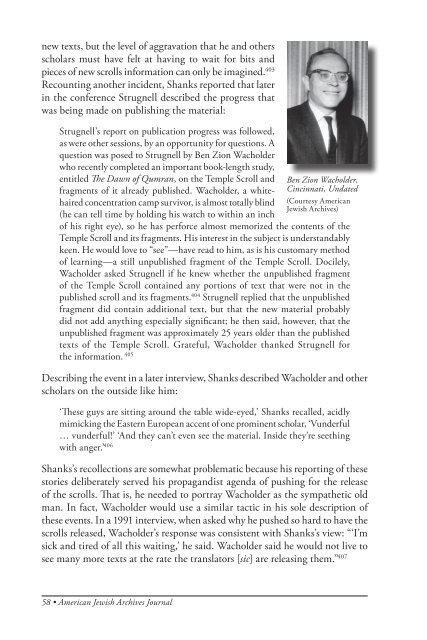The American Jewish Archives Journal, Volume LXI 2009, Number 1
The American Jewish Archives Journal, Volume LXI 2009, Number 1
The American Jewish Archives Journal, Volume LXI 2009, Number 1
Create successful ePaper yourself
Turn your PDF publications into a flip-book with our unique Google optimized e-Paper software.
new texts, but the level of aggravation that he and others<br />
scholars must have felt at having to wait for bits and<br />
pieces of new scrolls information can only be imagined. 403<br />
Recounting another incident, Shanks reported that later<br />
in the conference Strugnell described the progress that<br />
was being made on publishing the material:<br />
Strugnell’s report on publication progress was followed,<br />
as were other sessions, by an opportunity for questions. A<br />
question was posed to Strugnell by Ben Zion Wacholder<br />
who recently completed an important book-length study,<br />
entitled <strong>The</strong> Dawn of Qumran, on the Temple Scroll and<br />
fragments of it already published. Wacholder, a whitehaired<br />
concentration camp survivor, is almost totally blind<br />
(he can tell time by holding his watch to within an inch<br />
of his right eye), so he has perforce almost memorized the contents of the<br />
Temple Scroll and its fragments. His interest in the subject is understandably<br />
keen. He would love to “see”—have read to him, as is his customary method<br />
of learning—a still unpublished fragment of the Temple Scroll. Docilely,<br />
Wacholder asked Strugnell if he knew whether the unpublished fragment<br />
of the Temple Scroll contained any portions of text that were not in the<br />
published scroll and its fragments. 404 Strugnell replied that the unpublished<br />
fragment did contain additional text, but that the new material probably<br />
did not add anything especially significant; he then said, however, that the<br />
unpublished fragment was approximately 25 years older than the published<br />
texts of the Temple Scroll. Grateful, Wacholder thanked Strugnell for<br />
the information. 405<br />
Describing the event in a later interview, Shanks described Wacholder and other<br />
scholars on the outside like him:<br />
‘<strong>The</strong>se guys are sitting around the table wide-eyed,’ Shanks recalled, acidly<br />
mimicking the Eastern European accent of one prominent scholar, ‘Vunderful<br />
… vunderful!’ ‘And they can’t even see the material. Inside they’re seething<br />
with anger.’ 406<br />
Shanks’s recollections are somewhat problematic because his reporting of these<br />
stories deliberately served his propagandist agenda of pushing for the release<br />
of the scrolls. That is, he needed to portray Wacholder as the sympathetic old<br />
man. In fact, Wacholder would use a similar tactic in his sole description of<br />
these events. In a 1991 interview, when asked why he pushed so hard to have the<br />
scrolls released, Wacholder’s response was consistent with Shanks’s view: “‘I’m<br />
sick and tired of all this waiting,’ he said. Wacholder said he would not live to<br />
see many more texts at the rate the translators [sic] are releasing them.” 407<br />
58 • <strong>American</strong> <strong>Jewish</strong> <strong>Archives</strong> <strong>Journal</strong><br />
Ben Zion Wacholder,<br />
Cincinnati, Undated<br />
(Courtesy <strong>American</strong><br />
<strong>Jewish</strong> <strong>Archives</strong>)

















